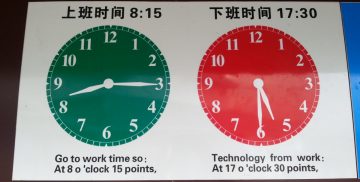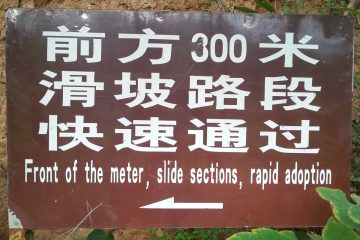On first glance, China is a very westernized, capitalistic country. Only gradually, you might experience a bit of a cultur shock (for example in a public toilet, when you suddenly face a Chinese on an open squat toilet). But I am getting ahead of myself – here are the peculiarities of China from the point of a view of a Westerner.
Traffic
- Even though there are traffic lanes, they are more of a guidance – in particular for motorbikes.
- At least in Beijing, the problem of air pollution (see below) has been partly recognized: I have not seen a single petrol-powered motorobike, only electric ones.
- Driving on Chinese roads requires a certain amount of recklessness and coolheadedness. Before overtaking, you simply announce that by flashing your headlights. In front of tight corners, you use the signal-horn. Reducing the speed is not necessary: As you have announced yourself, the oncoming traffic will get out of your way.
- Being able to read Chinese can also be helpful: Around Beijing, for exmaple, all traffic signs are also in Pinyin. In the countryside, this might not be the case. So, it might happen that you pass lots of signs without being able to read a single one of them – you just have to hope that at least the tourist attractions are also marked in Pinyin.
Economy and Environment
- China is booming. This leads to lots of aparment buildings being constructed all over the country. Surprisingly enough, sometimes there is only mud, but not streets, between them, and/or you might not see any workers around. Still, our guide assured us that someone will move into all these buildings within the next few months.
- Not using these apartment buildings would really be a shame. Some of them even have a great view of the cooling towers of the neighbouring nuclear plant.
- I have only seen the stereotype bamboo scaffolding in Hong Kong. There, it was used in multiple construction sites, though.
- Apparently, there is no unemployment in China. If there is not enough work, the people are kept busy by letting them clean a multi-lane highway with a broom that was apparently self-made out of some twigs.
- With such a booming economy, you cannot alway think of the environment, of course. As a result, the air (especially in the Northeastern part of the country) is heavily polluted. However, you have to see the bright side: While you cannot see the sun setting, it is already bright red for almost the whole afternoon.
Customs and Habits
A typical Chinese has apparently a few peculiarities:
- With about 1.4 billion fellow countryman, you cannot always be polite. Therefore, pushing and shoving is something like a national sport.
- Another national sport seems to be smoking. In a certain way, this is quite understandable: The air quality can hardly be any lower anyway.
- Still, the Chinese are concerned about their health. So, if some mucus has collected in their throat, they have to get rid of it – preferrably with a load, guttural sound.
- In the sleeping compartment on trains (between the individual carriages), there even seems to a be a plastic container for this very purpose.
- Another way of keeping healthy is exercising in the park or on the sidewalk every morning or evening: This can be something traditional like qigong, tai-chi, or kong-fu, or something more modern like – there are no other words to describe it – Chinese Square Dance.
- However, they have not yet realized that having some soap at the wash basins of public toilets could also be benefical for the health. Still, all public toilets are free, at least. Some of them are not even worth that much, though.
- Apparently, it is quite normal for a Chinese man to pull up his T-shirt to his breast, exposing his (beer) belly. Hiking in a suit (but without any shirt) is not frowned upon either.
- In contrast, Western tourists (especially females with long, blond hair) are sometimes openly stared at (and asked for pictures).
- The Chinese government seems to be aware that some of this behaviour might be strange for foreigners. Therefore, they issued a "Convention of Chinese Citizen’s Civilized Behavior in Domestic Travelling":
- Judging from the experiences mentioned above, you may realize that not all Chinese adhere to this convention.
Communication
- Chinese love there smart phone. They communicate either via WeChat, the Chinese equivalent of WhatsApp, or by an "old-fashioned" phone call. In the latter case, it is apparently important to hold your phone in a 90-degree angle to your head. This might lead to some speaking into the speaker end of your phone by accident, but no-one seems to bother.
- Keeping in mind the average volume of a Chinese, you realize that they could even hand over their phone to their neighbour and still be understood by whoever they are phoning.
- If you want to speak to a Chinese as a foreigner, you better know their language. If not, you need a translation app like Google Translate. It might not be perfect, but sometimes if works quite well (and can even translate a text captured by the camera on-the-fly). If it does not work well, you can at least have a laugh.
-
You can also have a laugh (or something to puzzle about) with some of the English labels. This affects both T-shirts (I was never sure whether prints like
Wasted Yoush
andMichean Uackson
(sic!) are on purpose or by accident) as well as signs (Yes, there are English signs, especially in touristy areas!). The latter may show some philosophical statement, …
… some failed, but quite amusing translations …
… or even some completely incomprehensible information.
Some translations are also that screwed up that they are again quite philosophical:

![Chinese lanterns [Picture]](https://bernies-journeys.at/wp-content/uploads/2016/11/IMG_1932.jpg)
![Apartment complex in construction [Foto]](../../../../wp-content/uploads/2016/11/20161020_154706-360x240.jpg)
![Convention of Chinese Citizen's Civilized Behavior in Domestic Travelling [Foto]](../../../../wp-content/uploads/2016/11/20161024_160211-360x240.jpg)



